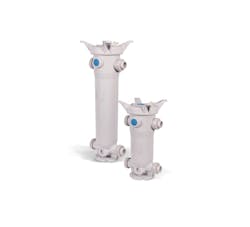Thermoplastic Filtration Systems Offer Flexibility, Ability to Process Harsh Chemicals
Across industries, thermoplastic filtration systems can present many advantages over metal filtration options. While some opt for metals for high pressure systems, they’re limited in their ability to handle corrosive chemicals. If a facility is running chemicals that don’t interact well with metal, leakage can result, causing damage to the equipment and posing a potential hazard for workers.
Today’s thermoplastic filtration systems offer a strong solution for applications where harsh chemicals are processed. For US Magnesium LLC, a primary producer of magnesium metal based in Salt Lake City, UT, thermoplastic filtration has proven successful in handling its harsh environment.
US Magnesium takes brine from the Great Salt Lake and goes through various purification steps to concentrate on magnesium chloride before ultimately converting that into magnesium metal. Through this process, US Magnesium also produces a variety of co-products commonly used in the water treatment industry.
Tim Gribben, process control manager, says the manufacturer has for years used filtration solutions from Hayward Flow Control for its ferric chloride and hydrochloric acid plants.
Hayward Flow Control has been in the thermoplastics business since the 1950s as one of the first developers of plastic valves. Its FLV Series, available in both PVC/CPVC and GFPP materials, offers a range of benefits and customizable options for any given application.
Hayward’s director of engineering and product management, Jon Stone, says the FLV Series is designed for higher pressure applications than most other filter vessels on the market. “It's designed for industrial applications, which means it's very robust,” he says.
When Hayward redesigned the FLV line in the last few years, it added true-union connections, which make it much easier for workers to take a unit apart compared to traditional systems that are flanged or threaded. If the user has to remove the unit, they can simply turn the system off, isolate the unit and unscrew union nuts for an easy dismantle, according to Dave Stewart, director of marketing and international sales for Hayward.
“The true-union design is just a tremendous advantage for the filter vessels that we build today, making it easier to install safely, and if anything does go wrong it allows the end user to replace it quickly with another unit,” says Stewart.
Stone adds that this process can generally be done without any tools aside from a strap wrench.
In addition to its unique design, the FLV series also comes in a wide variety of sizes. Whereas most thermoplastic and metal filters come in 2-inch size, Hayward designed this series with options ranging from 1¼ inches to 4-in. connections.
“If you're running a 4-in. pipe or 3-in. pipe, you can order a filter vessel that will meet your need,” Stewart says. “You don’t have to use reducing bushings or make shortcuts in your piping system to accommodate the 2-in. connection.”
The FLV series is also available in simplex, duplex and triplex configurations for a customizable system. Another benefit to the FLV Series is its longevity. While it depends on the specific application and chemicals being processed, Stewart says its thermoplastics can last 10 to 15 years on a site, if not longer.
“If it's being used with the right chemicals and line pressure, the filter will last a very long time,” Stewart says. “We see a lot of our old filter vessels still out there on the original installation 20 years on.”
Along with the quality of the product and its ability to handle harsh conditions, US Magnesium’s Gribben says a nice bonus of working with Hayward has been their support and technical service.
Through working with Hayward representatives and watching the company’s training videos on YouTube, Gribben says US Magnesium has been able to improve the life of its filtration systems and see an improvement in the quality of its output.
When it comes to technical support and engineering, Stewart says Hayward makes it a priority to work with end users to ensure everything is specified to their needs. “We'll provide a lot of that hands on support,” he says. “Filtration is not one size fits all.”
While Gibben says the filtration systems aren’t the least expensive on the market, he recommends Hayward to others in the industry and says they’re worth the investment.
“It's money well spent. We've been satisfied with their products, it’s easy to get parts and they can adapt quickly to customer needs. And on top of that, the technical support's been really good,” says Gibben.
